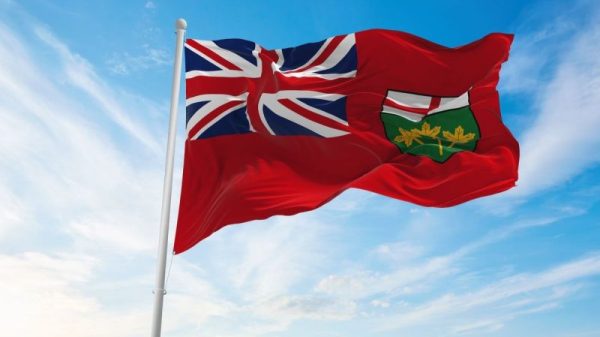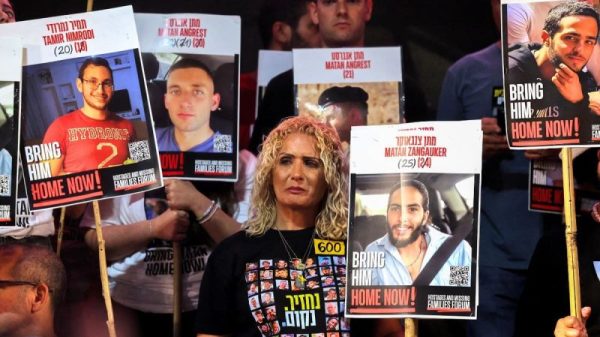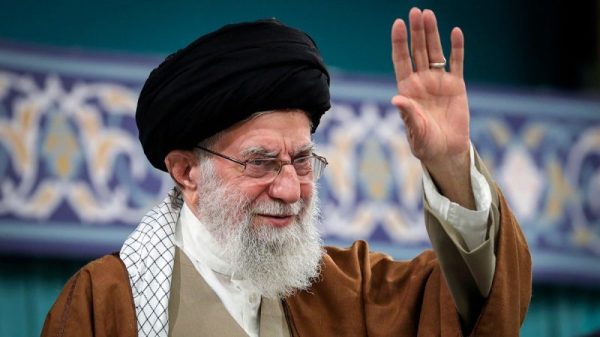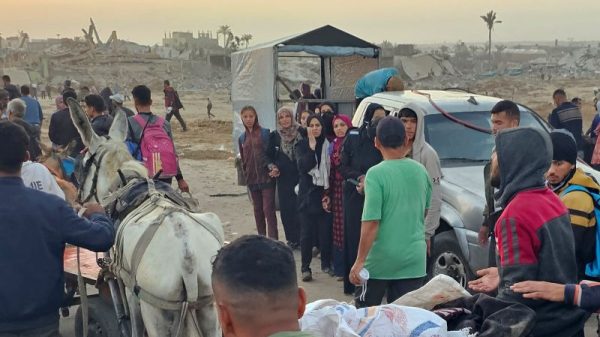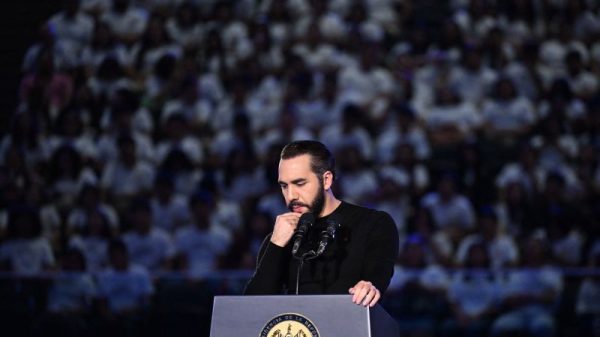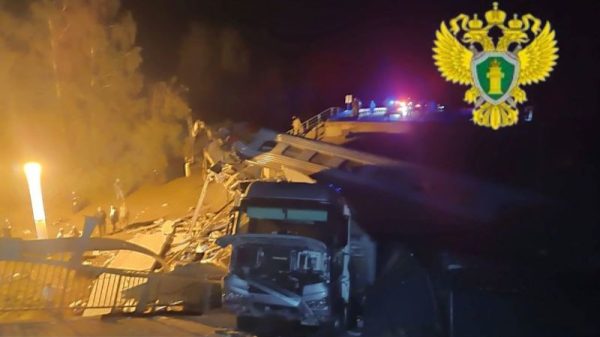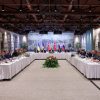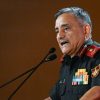Israel’s military conducted a “targeted raid” overnight in northern Gaza and vowed on Thursday to continue ground raids in the coming days, as the United Nations General Assembly met to discuss a proposed resolution for a humanitarian ceasefire.
Video published by the Israel Defense Forces (IDF) on Thursday showed tanks and armored vehicles, including a bulldozer, moving on a road near a fence in northern Gaza. The tanks fired artillery, and some destruction could be seen nearby.
Israel’s military will continue raids in Gaza over the coming days, IDF spokesperson Rear Adm. Daniel Hagari told a televised press conference later on Thursday. The ground incursions are intended to kill Hamas militants, lay the foundations for an all-out invasion and neutralize explosive devices and reconnaissance posts, he said.
The raid came as the humanitarian crisis deepens in Gaza, hastened by daily airstrikes and an Israeli blockade on life-saving fuel. Health services have been crippled by power shortages and hundreds of thousands of civilians have been forced to flee their homes amid the bombing campaign.
Israeli strikes have killed more than 6,850 people in Gaza, including thousands of children, since October 7, according to figures released Thursday by the Palestinian Ministry of Health in Ramallah, drawn from sources in the Hamas-controlled enclave.
Pressure is building on the international community to persuade Israel to allow desperately needed aid into Gaza; the United Nations and several countries in the region have called for an immediate ceasefire, while others advocate for a “humanitarian pause” in fighting. But the world has so far failed to unite around the crisis, nearly three weeks since the outbreak of violence, sparked by Hamas’ gruesome October 7 terror attacks that killed over 1,400 people in Israel and saw over 200 people kidnapped.
Riyad Mansour, head of the Palestinian Permanent Observer Mission to the United Nations, posed a blunt question to UN diplomats on Thursday as he recounted stories of Palestinians killed in Gaza.
“Almost all killed are civilians,” Mansour said. “Is this the war some of you are defending?”
UN member states are now preparing to vote on a draft resolution – put forward by Jordan on behalf of Arab states – after repeated failures to find consensus by the organization’s powerful UN Security Council.
The resolution calls for a “cessation of hostilities,” the release of hostages, and the rejection of “any attempts at forced transfer of the Palestinian civilian population.” But while General Assembly resolutions have political weight, they are non-binding.
Jordan’s Foreign Minister Ayman Safadi told diplomats gathered at the Assembly Hall that “collective punishment is not self-defense.” He also garnered rare applause inside the chamber as he said, “We care about all life, about all civilians: Muslim, Christian, Palestinians, Jews, Israelis – all life.”
Gilad Erdan, the UN’s Israeli ambassador, offered sharp criticism of the resolution being debated by the Assembly, describing requests for a ceasefire as “an attempt to tie Israel’s hands, preventing us from eliminating a huge threat to our citizens.”
The United States has also rejected proposals for a ceasefire, calling instead for “humanitarian pauses” to allow the desperately needed aid into Gaza. The US has also emphasized its full support for what it calls Israel’s “imperative” to defend itself.
The European Union on Thursday also called for humanitarian “pauses” in Gaza after a meeting in Brussels, but stopped short of calling for a ceasefire.
‘Hellfire on Hamas’
Israel has vowed to wipe out Hamas, the militant group which controls Gaza, and has repeatedly said that its current siege of the enclave will be followed by a ground operation. Prime Minister Benjamin Netanyahu said on Wednesday that the decision on when such action would be taken would be decided by Israel’s War Cabinet.
“We are raining down hellfire on Hamas,” Netanyahu said in a televised address, while claiming Israel has “already eliminated thousands of terrorists – and this is only the beginning.”
The prime minister also acknowledged for the first time that he will “have to give answers” for the intelligence failures that allowed the worst terror attack in Israeli history, saying it will be “examined fully” after the war.
Israeli forces said they killed the deputy head of Hamas’ Intelligence Directorate Shadi Barud – one of the Hamas officials they allege is partially responsible for planning the October 7 attacks – in a joint statement Thursday from the IDF and Shin Bet, the Israeli Security Agency. The Israeli military later said intelligence reports suggest air strikes have killed a Hamas rocket commander, Hassan Al-Abdullah, who the army says commanded rocket units in the Khan Younis area of Gaza.
The IDF and ISA released footage they claim shows the strikes that killed Barud, showing at least two damaged buildings in Gaza appearing to collapse. Hamas has not commented on the claim.
Flattened neighborhoods
Israel’s retaliatory air assault on what Israel calls Hamas “terror infrastructure” has since devastated the densely-populated 140-square-mile enclave, which had been described by rights groups as an “open-air prison” long before the current war began.
New satellite images released by Maxar taken on October 21, show significant destruction to sites across northern Gaza, with entire neighborhoods flattened in eastern Beit Hanoun and similar devastation near the Al Shati Refugee Camp, Atatra and Izbat Beit Hanoun.
At a press conference Thursday, Gaza health ministry spokesperson Ashraf Al-Qidra said 12 hospitals had been rendered non-operational since Israel’s air campaign began, and 101 medical personnel had been killed.
He accused Israeli forces of deliberately causing a complete collapse of the healthcare system by obstructing the entry of fuel and essential medical supplies into Gaza. Israel says it does not allow fuel because Hamas diverts fuel transfer into Gaza for military purposes.
On Wednesday, Al Jazeera said its bureau chief in Gaza, Wael Al-Dahdouh, lost his wife, son, daughter and grandson in what it said was an Israeli airstrike. The blast hit a house in the Nuseirat refugee camp in the central Gaza Strip where the family was taking shelter after being displaced, according to Al Jazeera. In total, 12 members of the Al-Dahdouh family were killed in the blast, including nine children, a statement from the family said Thursday.
“Strikes on military targets are subject to relevant provisions of international law, including the taking of feasible precautions to mitigate civilian casualties,” it added.
According to the Committee to Protect Journalists (CPJ), at least 24 journalists have died since the start of this conflict as of Wednesday. Twenty of those killed are Palestinian, three are Israeli, and one is a Lebanese journalist, CPJ said.
A total of 1.4 million people – of Gaza’s population of more than 2 million – have been displaced since October 7, with almost 629,000 people living in UN shelters, OCHA said. Half of Gaza’s population are children.
The UN Relief and Works Agency (UNRWA) in Gaza said Wednesday it will have to halt aid operations within a day if fuel is not delivered, saying it would mark the end of a “lifeline” for civilians.
“Do we provide fuel for desalination plants for drinking water? Can we provide fuel to hospitals? Can we provide the essential fuel that is currently producing the bread that is feeding people in Gaza?” he said.
At least 38 United Nations workers have also been killed, according to an update by the UN humanitarian office OCHA.
Mediation talks
Meanwhile in Moscow, representatives from Hamas held talks with a senior Russian foreign ministry official on Thursday, according to Russian state media TASS and a statement from Hamas. TASS said the discussions centered on the release of hostages held by Hamas and the evacuation of Russian citizens from Gaza.
The Hamas delegation praised the position of Russian President Vladimir Putin and the efforts of Russian diplomacy, according to the militant group’s statement. Mousa Abu Marzouk, deputy chief of Hamas’s political bureau, and Basem Naim, another senior Gaza-based Hamas leader, were part of the delegation which met with Russian Deputy Foreign Minister and Special Presidential Representative for the Middle East and Africa, Mikhail Bogdanov, it also said.
Israel responded furiously to reports of the meeting. “Israel condemns the invitation of senior Hamas officials to Moscow, which is an act of support of terrorism and legitimizes the atrocities of Hamas terrorists,” Israel’s foreign ministry said in a statement, calling for Russia to expel the Hamas delegation “immediately.”
Qatar, which is helping to mediate with Egypt, US, Israel and Hamas, is hopeful for a breakthrough soon on negotiations to release hostages held by the militant group, the prime minister and foreign minister said Wednesday.
The hostage crisis is a truly international one.
Israel’s government press office said 135 hostages – more than half of those being held by Hamas – hold foreign passports from 25 different countries.
They include 54 Thai nationals, 15 Argentinians, and 12 citizens from Germany and the US.
Four hostages – two American and two Israeli – have been freed so far. Talks to secure the release of the rest of the hostages being held by Hamas in Gaza are ongoing, Qatari Foreign Minister Sheikh Mohammed bin Abdulrahman Al Thani said.
US President Joe Biden said Wednesday he told Netanyahu that if it’s possible to secure the release of hostages in Gaza ahead of an Israeli ground invasion, he should do so.
But Biden said flatly “no” when asked whether he’d sought assurances from his Israeli counterpart that he would hold off on a ground invasion while the hostages remain in custody.
This is a developing story and will be updated.




